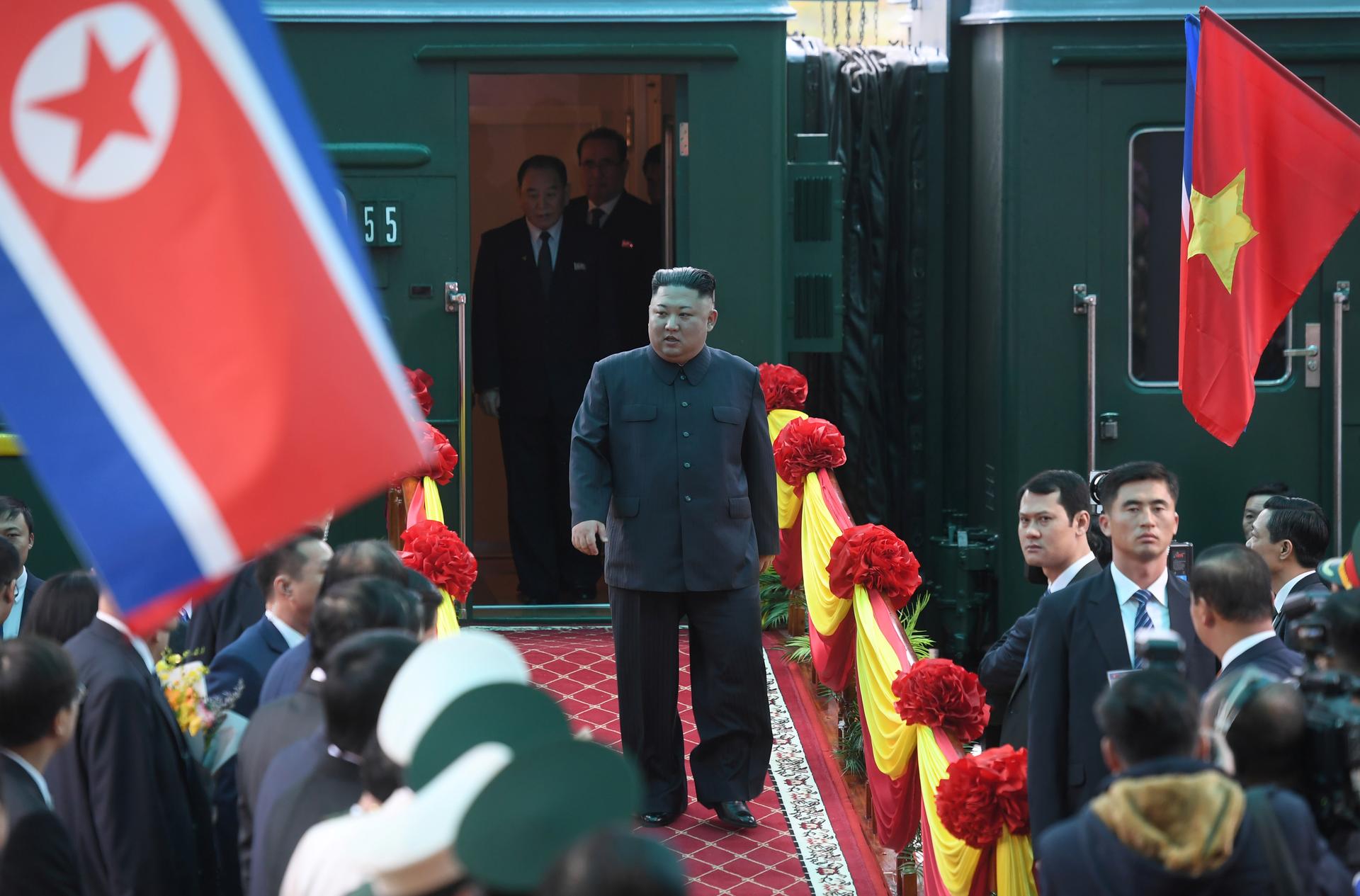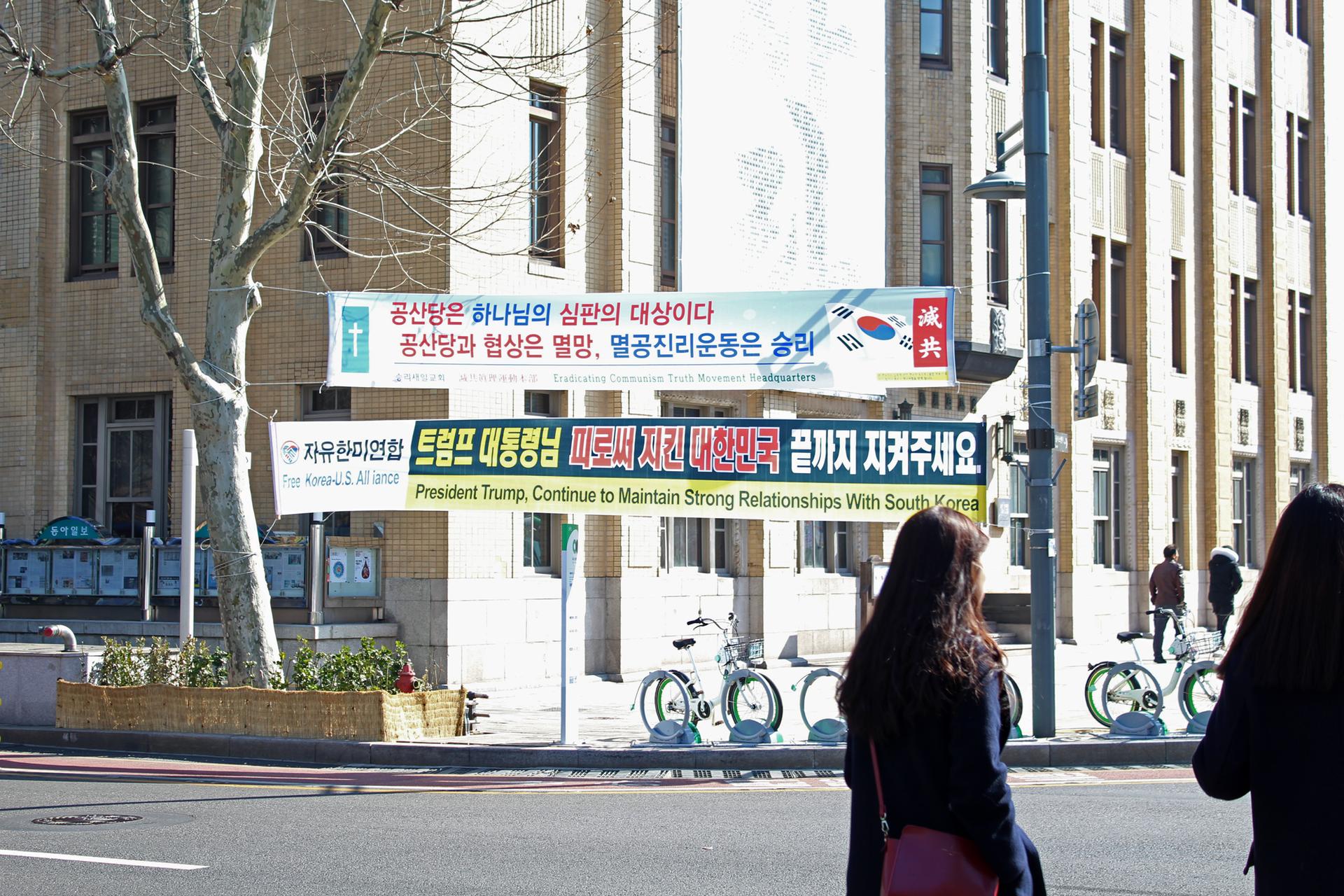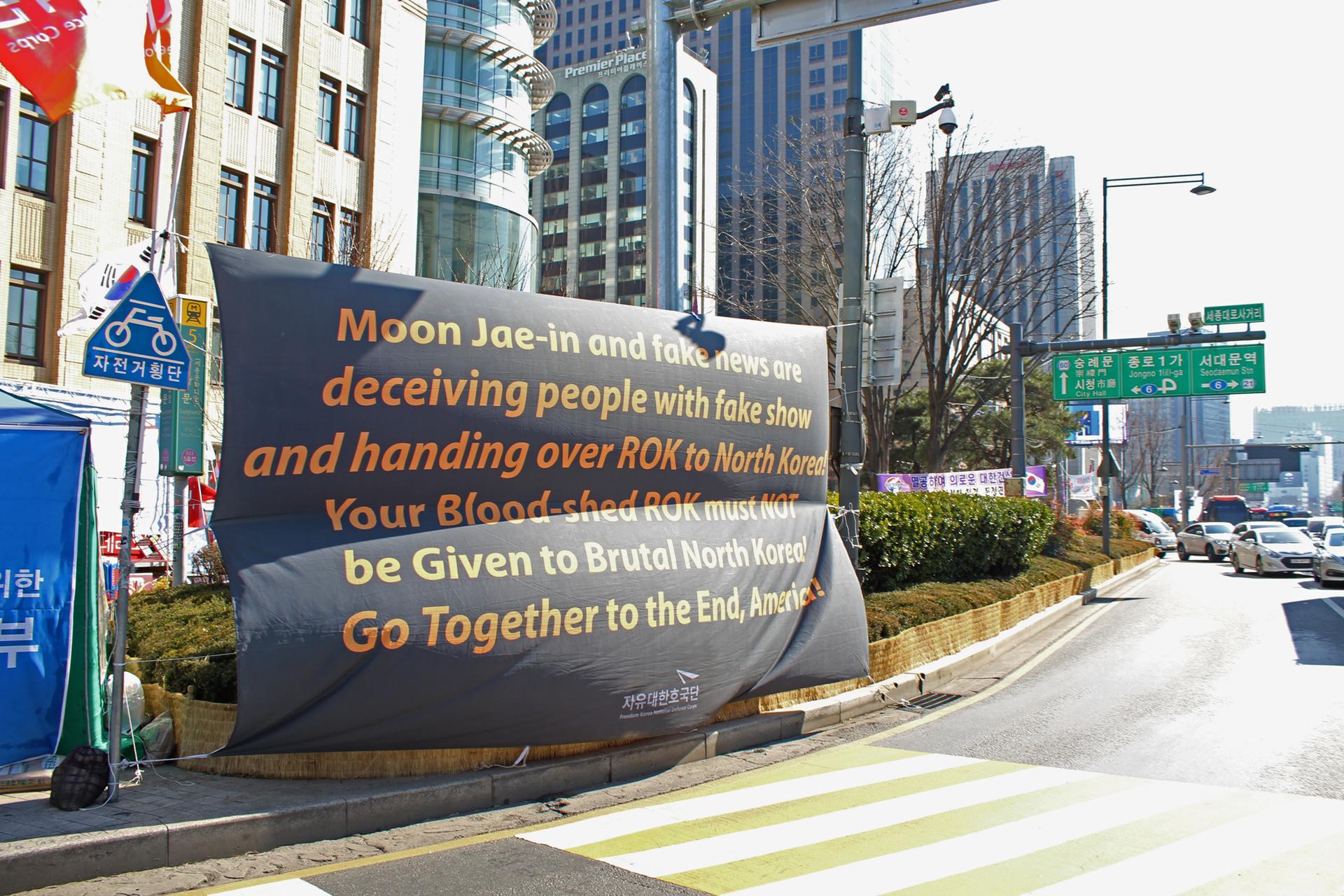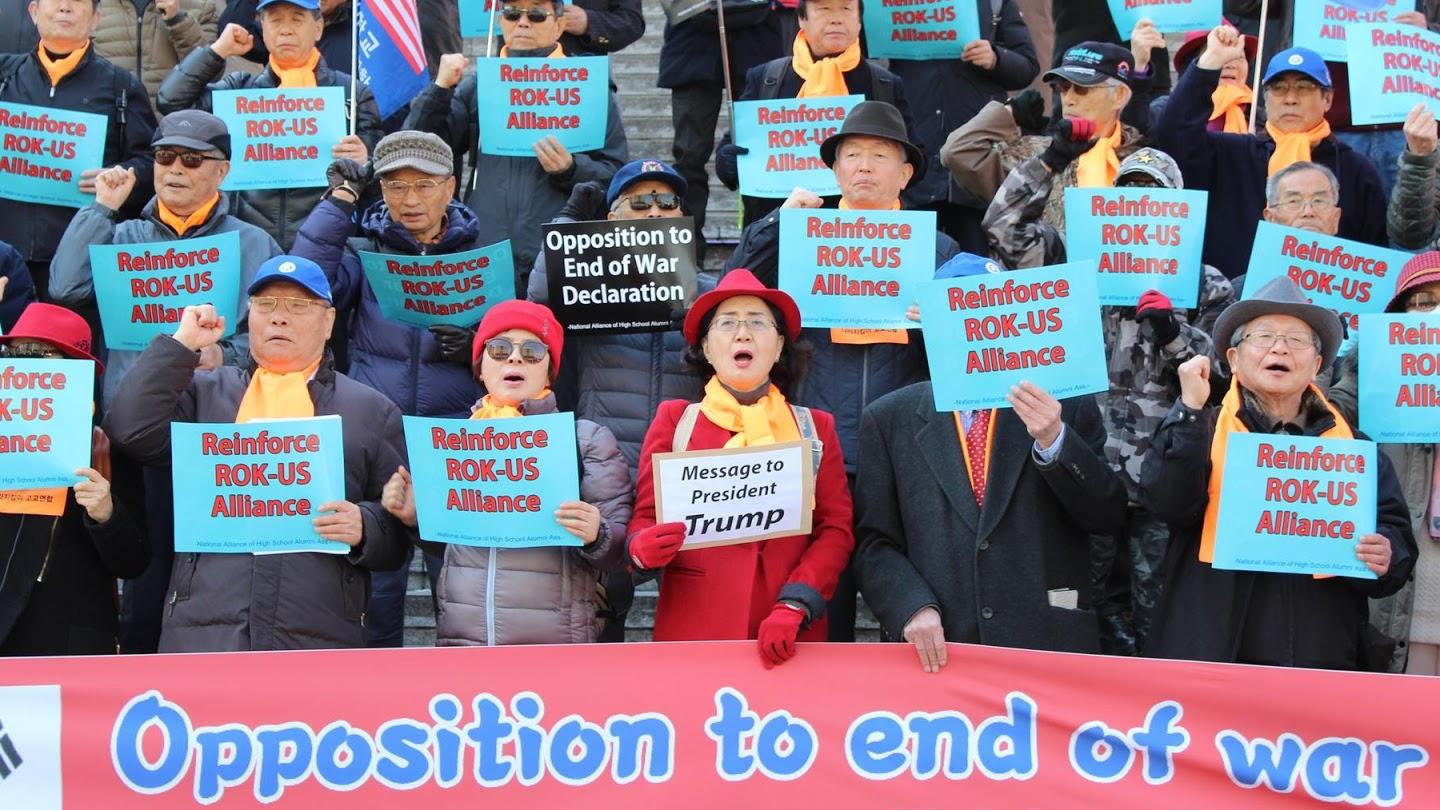Some South Koreans say Trump-Kim summit is ‘all political theater’
A group of protestors hold up signs urging the US and South Korea to maintain a strong alliance against North Korea in Gwanghwamun Square on Feb. 26, 2019. One woman, against the summit and inter-Korean cooperation, holds a sign that says, “Message to President Trump.”
Donning his infamous black suit and a PR smile, North Korean leader Kim Jong-un emerged from his armored train in Dandong, China, on Tuesday after a more than 60-hours-long ride. Then, with a wave for the cameras, he slipped into a limousine headed toward Hanoi, Vietnam, where he will meet President Donald Trump for a second time tomorrow.
The Vietnam summit — slated for Feb. 27 and 28 — is expected to yield key moves regarding denuclearization, international sanctions against Pyongyang and a possible declaration ending the Korean War. Yet, as the rest of the world tunes in for an event that could make or break the latest wave of diplomacy, many South Koreans seem apathetic at best.

“I definitely get the sense that Koreans don’t care as much about diplomatic developments between the North and South anymore. … I won’t be paying attention to the summit … I know I personally do not think about it in my daily life, and I think that’s the case for most people.”
“I definitely get the sense that Koreans don’t care as much about diplomatic developments between the North and South anymore,” said Lee Jun-young, a 24-year-old student from Gangnam. “I won’t be paying attention to the summit … I know I personally do not think about it in my daily life, and I think that’s the case for most people.”
On the eve of the second US-North Korea summit, only a few dozen camped out to protest a much-anticipated end to the nearly 70-year Korean War. Part of a well-known, elderly, conservative bloc, they claim improved relations between North and South Korea could threaten Seoul’s alliance with Washington — or even worse, prompt Trump to withdraw troops from the Korean peninsula. But aside from their intermittent chants and cries, few others turned up to comment on the summit — not even the usual pro-diplomacy peace demonstrators.

“I think most Koreans don’t even take the time to think about it because they’re so busy and because it doesn’t have a direct effect on their daily life,” said Kim Byung-gu, a 39-year-old worker at a clothing manufacturing company. “They don’t care at all.”
Part of the reason could simply be that the meeting is happening in Hanoi instead of Seoul. But developments have also been slow since the Singapore summit last June, which isn’t exactly promising for South Koreans, who have long-held suspicions about the North Korean regime’s true intentions.
Related: Kim Jong-un’s next summits will apparently be with Vladimir Putin and Bashar al-Assad
This time around, it’s hard to tell how many South Koreans will be glued to the TV. Although Korean newspapers and TV stations will no doubt track the meeting as it unfolds, many South Koreans say they’re more interested in hearing their president address the nation’s sputtering economy or youth unemployment crisis.
Kim Tae-seok, a 22-year-old office worker, put it frankly: “If it’s not going to help South Korea’s economy or job market, there’s not much reason for people to care it — whether that be the summits or President Moon’s encounters overseas. As time goes by, it really feels like people see [the summits] as just intermittent news flashes online.”
However, polls suggest that South Koreans have split expectations of the Vietnam summit. In a recent survey of 1,323 citizens, nearly 50 percent said they believe the Vietnam summit will be more successful than the last US-North Korea summit in Singapore in June 2018, which was mostly ceremonial and did not produce clear takeaways. Another roughly 29 percent predicted “little difference.” And when it comes to denuclearization, 35.5 percent of respondents believe that nuclear talks “will continue without any progress.”
“Trump is in it to raise his approval ratings, and the biggest beneficiary of all of this is Kim Jong-un, a mass murderer who killed his own half-brother … It’s still all political theater.”
“I don’t really care about the US-North summit talks because it’ll just lead to another meeting with more talk,” said Jung Gwang-il, a North Korean defector and head of defector-activist organization No Chain for North Korea. “Trump is in it to raise his approval ratings, and the biggest beneficiary of all of this is Kim Jong-un, a mass murderer who killed his own half-brother … It’s still all political theater.”

Previous summits with Kim Jong-un have certainly yielded good-willed, but painfully vague promises.
Related: North and South Korea come together in historic summit
All three nations — South Korea, North Korea and the United States — pledged to broker a peace declaration and an end to the Korean War. North Korea has taken several steps to show its commitment to a slow, give-and-take denuclearization, including the repatriation of US soldier remains and the dismantlement of a missile testing facility. However, it so far hasn’t been enough to mobilize the United States to lift UN sanctions against Pyongyang — and because of these sanctions, South Korean President Moon Jae-in can’t build his inter-Korean rail system or re-open the Kaesong Industrial Complex as planned.
The Kaesong Industrial Complex, located inside North Korea just across the demilitarized zone from South Korea, was launched in 2004 to increase cooperation between North and South Korea and strengthen North Korea’s economy. It has been closed since 2016 when the South Korean government halted operations in response to a North Korean ballistic missile test.
“How does opening Kaesong benefit ourpeople?” said Jung, a North Korean defector and activist. “It doesn’t solve South Koreans’ job-hunting problems. It only helps investors and the North Korean regime.”
“Tremendous amounts of [money] and welcoming gestures have been offered to the North, and it offends the many South Koreans who are demanding attention from President Moon. It’s building up a growing resentment against President Moon and his diplomacy with North Korea. … Reopening Kaesong or building railways should bring us economic wealth, but President Moon should remember who he’s supposed to be serving first: South Koreans.”
Not all South Koreans are thrilled to hear that their president wants to spend $260 millionon North Korean transit while their country suffers economic woes.
“Tremendous amounts of [money] and welcoming gestures have been offered to the North, and it offends the many South Koreans who are demanding attention from President Moon. It’s building up a growing resentment against President Moon and his diplomacy with North Korea,” Kim Tae-seok said. “Reopening Kaesong or building railways should bring us economic wealth, but President Moon should remember who he’s supposed to be serving first: South Koreans.”
Related: Diplomacy between Kim Jong-un and Trump is unraveling, and South Korea’s president will suffer
But even as attention appears to be waning, there’s no doubt a significant number of South Koreans will be holding out hopes for progress.
“There are many people who do care,” said Park Byung-Gwan, 26. “And, of course, I want the summit to go really well.”
